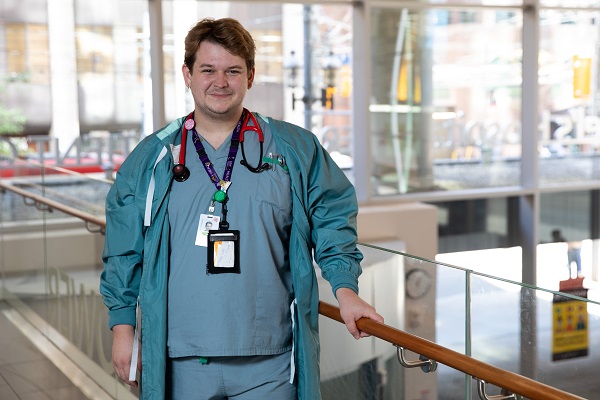By Danielle Pereira
Since completing a nursing student placement at St. Michael’s Hospital in December 2020, Conor Goulden knew he wanted to find a permanent spot at the hospital.
“I did a student placement in my fourth year in the Cardiac Intensive Care Unit (CICU), and I remember thinking it didn’t seem possible to work in a workplace and love it so much that you almost feel like crying at the end,” he recalls.
Goulden hoped to find another student placement at St. Michael’s, but due to the COVID-19 pandemic there were no spots at the time. A few months later, he noticed a posting online for a paid clinical extern position that seemed like the perfect fit.
Since last year, the Ontario Ministry of Health has funded a clinical extern program to support organizations with health human resource challenges resulting from the pandemic. This funding support is slated to continue until March 2023.
Canadian healthcare employers have the highest ever level of job vacancies – with over two-thirds of those positions in nursing roles, according to Statistics Canada. Select hospitals in Ontario, including Unity Health Toronto, were invited to participate to support clinical externships, one of several initiatives the organization has undertaken to address clinical staffing vacancies.
Clinical externs are students who are still in the process of completing their educational programs. Employed as unregulated care providers (UCPs), they can help with specific care tasks, such as assisting patients with activities of daily living, supporting ambulation, positioning, feeding and toileting, as well as supporting admission assessments, preparing patients to go for tests, etc.
“Although they can’t do the same kind of work as a fully-trained nurse, externs help with duties that improve the quality of care for patients and play a support role to the unit,” says Julie McShane, Clinical Educator of Nursing Professional Practice at Unity Health. “Externships aren’t necessarily new – some hospitals have used them to provide summer employment to students for many years – but they’ve taken on an expanded importance with the pandemic and health system pressures.”
Once clinical externs have completed their formal education, Unity Health looks for opportunities to hire them into full-time and part-time roles. So far, 44 of the 157 individuals hired as clinical externs have transitioned into registered nurse (RN) and registered practical nurse (RPN) roles, says Kaleil Mitchell, Project Manager II, Nursing Practice and Education.
Goulden says his externship with the inpatient orthopedics unit at St. Michael’s was an opportunity to supplement his nursing education by being able to observe nursing on a unit more broadly.
“It was like watching a live action documentary of nursing practice on a unit,” he says. “As a nursing student you’re assigned one preceptor, but as an extern some days you would be paired with one nurse, another day two nurses, or some days you’d be assigned an area in the unit.”
“It allowed me to observe how different people do things and you get to observe different skills, especially things like documentation, and it also gave me a chance to lift the fear of simple things, like calling locating to page somebody.”
Clinical externs also have the ability to build skills in communicating with patients, says McShane.
“Externs have that close contact with the patients they’re assigned to and a bit more time for longer patient interaction, which can be a great help on a unit that’s short staffed,” she says. “It’s also another opportunity to see and to make connections with different areas of the hospital because there are limited opportunities for students in the course of an undergraduate program to see different areas.”
After completing his externship and graduating from his nursing program, Goulden was hired full-time as a RN, first in the cardiovascular (CV) surgery unit and now in the CICU at St. Michael’s.
“I really can say with full confidence and belief that if I didn’t do my clinical externship, I would not have been fully functional in CV surgery or the CICU,” he says “The externship allowed me to observe and become familiar with a lot of things, like policies, equipment and medication, without being responsible for it. So when I started in these fast paced areas, I felt more comfortable.”
Goulden adds that the nurses on the orthopedics unit where he completed his externship really embodied what it meant to be a teaching hospital.
“During my externship, often the nurses would come and say, ‘I have this neat thing that you probably haven’t seen, come over and have a look’, he says. “Everybody recognizes we’re a teaching hospital genuinely, and everybody wants to teach. That part of the experience has been invaluable to me starting my career.”
Danielle Pereira is senior communications advisor at Unity Health Toronto.


